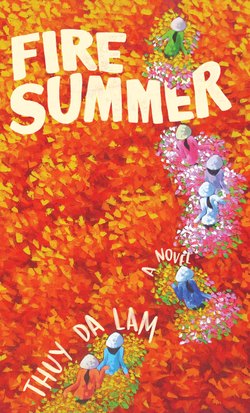Читать книгу Fire Summer - Thuy Da Lam - Страница 13
На сайте Литреса книга снята с продажи.
Phat Salon
ОглавлениеNO ONE HAD seen the dragon, only traces of its inky tail across the right collarbone of the owner of Phat Salon in Little Saigon, Orange County. The tail undulated as Phat cut a client’s hair and styled a look that revealed the woman’s true inner self.
“Inner-outer correlation,” he would say.
The transformation began with Phat serving the client a cup of hot herbal brew and a slow, deep massage of her feet until she sighed softly. He would then leave the room. When he returned, he cut the woman’s hair in a single fluid motion as she gazed at her reflection in the mirror and imagined the hidden dragon on his supple body—hairstylist by day and mixed martial artist by night.
Curiosity drew a steady stream of patrons to Phat Salon on Bolsa Avenue.
A flying dragon with enormous bat-like wings, a client whispered.
A sea dragon rises from the East, another said.
Phat’s ex-girlfriend from Berkeley had the last word: a black serpent coils tightly around his hard torso and breathes fire on his sex.
But Maia knew the creature was incomplete. What Phat had was only the tip of a tail. When the tattoo needle hit a nerve on his shoulder blade, Phat’s body went into shock. He fainted and was rushed to the emergency room.
Maia also knew it was not a dragon tail.
“A fish tail?” Phat repeated in disbelief, looking up at Maia from the low wooden stool, his fingers interlocking her toes. She was a walk-in, long straight hair dry and brittle with split ends from four years of college in the Northeast snow belt.
“A monstrous fish,” she said and told him a fish story she had read in her folklore class. Though Phat was not convinced even after the day she showed him the enormous fishtail stone displayed at the Museum of Folklore & Rocks where she was the curator’s new assistant, they quickly became friends.
In Little Saigon, where people consumed U.S. goods and participated in Vietnamese rituals and festivities, Phat and Maia, orphans at an early age, tended to the void of their parents’ absences in different ways. Phat further emptied himself in order to flow and become ungraspable, a defense in the martial arts ring and in life. Maia filled her void with stories. Phat strived to be mirror-like; she sought mirrors.
When word arrived that Vinnie Huynh went missing after landing at Tan Son Nhat Airport on Tết, the Independent Vietnam Coalition approached Maia with an offer of a research grant, with one stipulation: she was to be the liaison between the Coalition and E. Tien. Maia could not refuse the opportunity to travel to places she had only studied and read about in library books. She convinced herself that accepting the assignment was an act of love for her late father—to continue his legacy. The return was a chance to reconnect with family.
A week before her trip to Vietnam, Maia made an appointment at the salon. Phat served her a cup of warm herbal tea and massaged her heels, arches, and toes. He meditated and meditated but could not see her true inner desires.
He finally asked, “You’re returning to Vietnam to collect stories on rocks?”
“In four provinces, from central Vietnam to the northernmost border with China, stands a wife-rock atop a mountain cradling a child waiting for her husband’s return. Some believe he’s gone fishing in the South China Sea; others say he’s gone off to war. The story of Hòn Vọng Phu, a wife who turns into stone waiting for her husband’s return, shapes and is shaped by the physical terrains of Vietnam and the people’s expressions.”
He seemed unmoved.
She repeated the questions from her college project: “Why is Hòn Vọng Phu so prevalent in the imagination of the Vietnamese? How have the tale and its modern adaptations transformed in the diasporic community, where a confluence of histories, cultures, and languages interact? How do these stories narrate Vietnam’s national identity?”
He gave her a blank stare.
She then showed him the news clip of E. Tien. “I’ve been tasked by the IVC to look for my great-aunt.”
He remained silent.
She finally pulled out an old yellowing envelope with the address from her maternal grandmother’s last letter and told him the real reason for her wish to return. “Someone there might be able to tell me what happened to my mother. Even if this were all a dream,” she said, forestalling his butterfly dream parable, “I’d still want to know.”
He trimmed her split ends but left her long hair as it was, a drying river seeking the sea.
